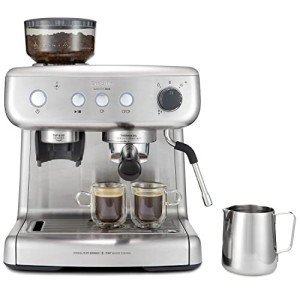The Rise of Home Espresso Machines: A Comprehensive Guide
As coffee enthusiasts continue to look for fresh and flavorful brews in the house, the popularity of home espresso machines has risen in recent years. No longer just the domain of coffee shops and cafe, these machines empower people to craft barista-quality espresso beverages from the convenience of their kitchen areas. This article will check out the various kinds of home espresso machines, their features, and factors to consider for picking the best one. Additionally, it will provide a choice of FAQs to assist potential purchasers make notified decisions.
Types of Home Espresso Machines
Home espresso machines can be categorized into numerous classifications based upon their mechanisms and user-friendliness. Each type has its distinct features, pros, and cons.
| Type | Description | Pros | Cons |
|---|---|---|---|
| Manual Espresso Machines | Requires the user to by hand control the brewing procedure, including techniques like pulling a lever to create pressure. | - Complete control over developing process - Compact design | - Requires ability and practice - Time-consuming |
| Semi-Automatic Machines | Machine automates water circulation and pressure, however the user still manages the dosing and duration of the developing process. | - Balance of automation and control - Versatile | - Learning curve for perfecting techniques |
| Fully Automatic Machines | Automates the entire developing process, from grinding to brewing, often with programmable settings for customized drinks. | - Extremely user-friendly - Quick and convenient | - Less control over the brewing process - Higher cost point |
| Pill or Pod Machines | Uses pre-packaged espresso capsules or pods to develop coffee quickly and easily. | - Extremely simple to use - Minimal cleanup | - Limited taste range - More costly per cup than ground coffee |
| Super-Automatic Machines | Combines features of fully automatic machines with built-in grinders, permitting users to brew whole bean espresso and milk-based beverages with one touch. | - All-in-one convenience - Ideal for milk-based beverages | - Often the most pricey - Can be bulky |
Functions to Consider
When choosing a home espresso machine, prospective purchasers need to consider the following functions to guarantee they select a machine that fulfills their needs:
Grinder Type:
- Built-in grinders can supply fresher grounds however may require more maintenance.
- Different grinders permit more modification of grind size.
Pressure:
- Look for machines that produce a minimum of 9 bars of pressure, which is ideal for brewing espresso.
Water Temperature Control:
- Machines with adjustable temperature settings permit for better extraction of taste from beans.
Milk Frothing Options:
- Consider whether you desire a manual steam wand for frothing or an automatic milk frother for benefit.
Ease of Cleaning:
- Machines with detachable parts and self-cleaning functions significantly minimize cleanup time.
Size and Design:
- Ensure the machine fits easily in your kitchen and aligns with your aesthetic choices.
Budget:
- Set a budget before beginning your search, as prices can vary significantly from affordable designs to high-end machines.
Benefits of Home Espresso Machines
Owning a home espresso machine uses many advantages:
- Cost-Effective: Over time, brewing espresso at home can save coffee enthusiasts money compared to regular coffee shop check outs.
- Modification: Users can explore different beans, grind sizes, and brewing methods to find their best cup.
- Convenience: The capability to brew espresso whenever removes the requirement to head out to a coffee shop, specifically beneficial during late nights or mornings.
- Quality assurance: With a home machine, people have complete control over the quality of active ingredients and developing processes.
Disadvantages of Home Espresso Machines
Nevertheless, there are some disadvantages to think about:
- Initial Investment: High-quality espresso machines can be pricey, needing a considerable in advance financial investment.
- Knowing Curve: Mastering the art of espresso developing can take time and practice, which may be frightening for novices.
- Upkeep: Like any appliance, espresso machines require regular cleaning and maintenance to guarantee optimal performance.
FAQs
1. What is the best type of home espresso machine for beginners?
Answer: For beginners, a semi-automatic machine is typically advised as it provides a balance between control and automation, permitting you to learn the fundamentals without overwhelming intricacy.
2. How much should I invest in a home espresso machine?
Answer: Entry-level machines can begin around ₤ 100 to ₤ 300, while higher-end models can vary from ₤ 500 to over ₤ 2000. It's necessary to set a budget based on your anticipated use and desired features.
3. Do I require a separate grinder?
Response: While some espresso machines come with integrated mills, purchasing a separate grinder enables greater modification and makes sure much better quality premises.
4. How typically should I clean my espresso machine?
Answer: Cleaning frequency can differ by machine type, but it's typically suggested to clean the machine after each use and carry out deep cleansings weekly or month-to-month, depending upon use.
5. Can I make milk-based drinks with any espresso machine?
Response: Not all machines come with milk frothing abilities. If you delight in drinks like lattes or coffees, search for a machine with a steam wand or automatic frother.
Home espresso machines are changing the way coffee aficionados enjoy their cherished brews. With different types and advanced functions offered in the market, there is something for everyone. Whether it's the joy of developing special recipes or simply appreciating the perfect shot of espresso, investing in a home espresso machine can boost both the coffee-drinking experience and the quality of life for coffee enthusiasts everywhere. As with Get Source , it is vital to weigh the advantages versus the prospective drawbacks and choose a machine that effortlessly fits both your way of life and choices.

